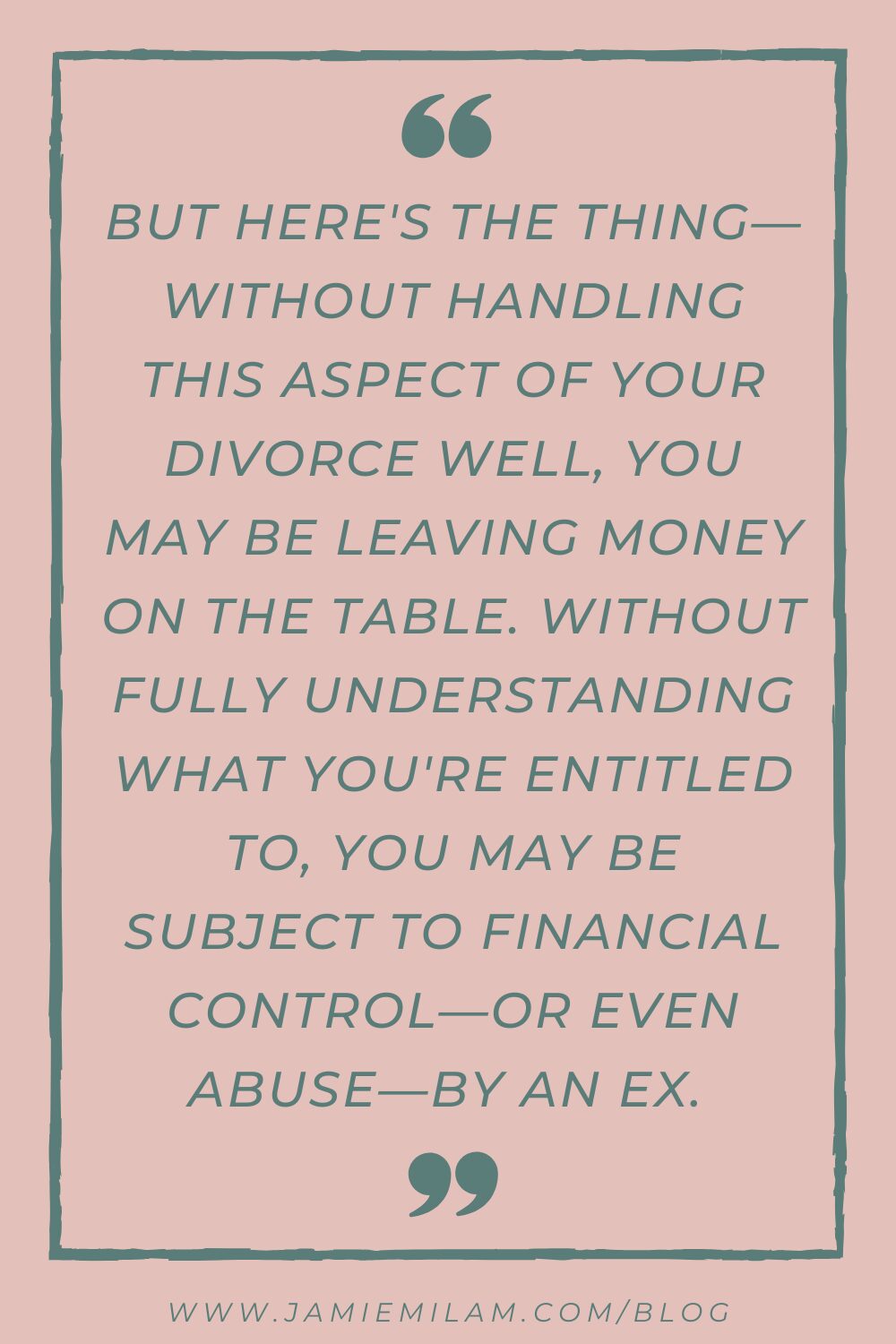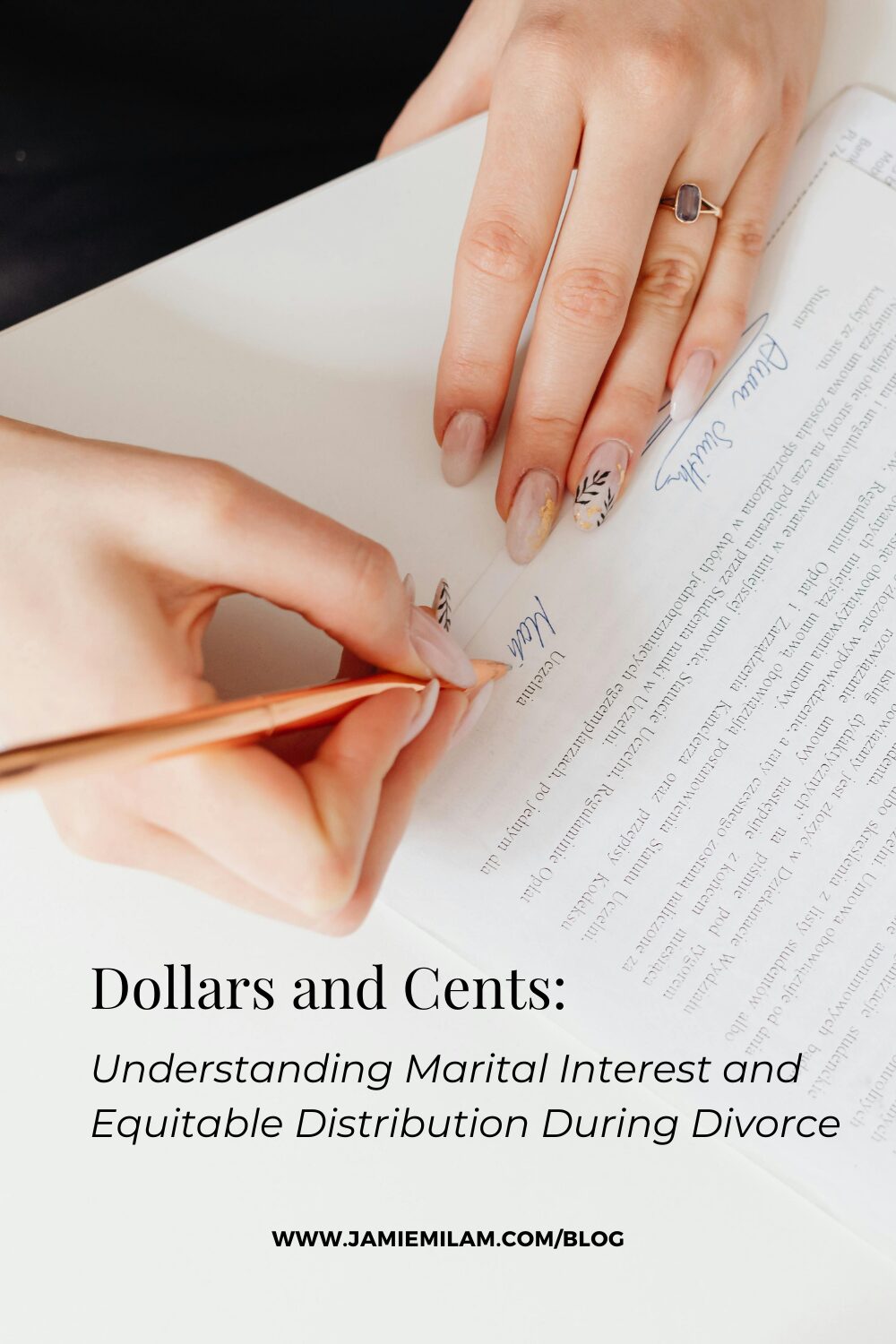THE BLOG
THE BLOG
*This website uses affiliate links which may earn a commission at no additional cost to you. As an Amazon addict and Associate, I earn from qualifying purchases, but I'm only recommending products I love!
Browse More Blog Posts:

Dollars and Cents:
Understanding Marital Interest and Equitable Distribution During Divorce
There are many things to expect during divorce: big emotions, new routines, and a whole bunch of post-divorce "firsts" you didn't expect. But one less-anticipated, but equally important, aspect of navigating divorce is splitting your assets.
The excuses to ignore this important topic are already there in your mind. They might sound like, "I've never handled the finances," or "It's all got to be 50/50 anyway" or "I've got a million and one things to do and don't have time to do research—I'll just trust my lawyer [or ex] to do it."
But here's the thing—without handling this aspect of your divorce well, you may be leaving money on the table. Without fully understanding what you're entitled to, you may be subject to financial control—or even abuse—by an ex.
That's why it's of paramount importance that you take the time to understand concepts like marital interest and equitable distribution when dividing assets. Here we offer a high-level overview of these concepts so you can start to understand them, but it's important to seek professional and personalized advice for your unique scenario.
Marital Interest and Equitable Distribution: Definitions and Details
Property is the things you own. And when speaking about it in the context of marriage and divorce, it's a wide catch-all for everything from your home and other real estate or even a business to your material collections and financial accounts.
Some of your property was acquired pre-marriage and some post-marriage. So, the first important distinction to know is the difference between marital and separate property. While there are caveats to this, the simple definition is this:
- Separate property: Property that was purchased prior to the date of your marriage or after the date of your separation. For example, one spouse purchased a house three years before they got married.
- Marital property: Property acquired after the date of your marriage and prior to the date of your separation. For example, one spouse purchased a house six months after getting married.
So while one spouse may have separate property—the house they bought three years before marriage—the other spouse may still obtain marital interest in the said separate property. This typically happens in one of four ways:
- Separate property is converted into community property by adding the spouse to the title of the property, for example.
- Both spouses contribute community property funds towards separate property by, for example, using income or earnings during marriage to pay down the debt on a separate asset.
- Community time, effort, or energy is contributed to a separate asset such as, for example, one spouse owning separate property, but the second spouse spends considerable time and effort to increase the value or it.

It's important to remember that any income, asset, or debt that was earned or accrued during the time of the marriage is considered a marital asset or debt—regardless of whose name it is in or who is making payments on it, if it is in the duration of your marriage.
The next thing to consider is how states consider property division, which happens in one of these two ways:
- Community property: Most likely to split assets 50-50 between exes.
- Equitable distribution: Aiming for fair equity, which may be 50-50 or something else. This is how the majority of states handle marital asset distributions.
An equitable distribution system considers a large number of factors and is totally unique to each situation.
For example, if one party was earning lower or no income, they wouldn't have been able to contribute as much to the retirement funds, nor would they have as much financial security in the future. So, a judge may rule that they are entitled to a higher percentage of that retirement fund in the distribution of assets. It's really about looking at the financial circumstance in totality.
While 50-50 is a common starting point for negotiations, it may not always end up as an exact 50-50 based on many factors such as:
- The length of your marriage.
- When an asset was acquired.
- Who is listed on the title or owns the item.
- What the plans are for your children (i.e., staying in a marital home long term).
- Where the money for the payments came from.
- The earnings and earning potential of each individual.
The main point here is that while a spouse may have separate property, there is often still marital interest in said property. And, when it comes to who gets what during a divorce, most states will use the equitable distribution model, which takes a number of factors into consideration and can be very difficult to decipher on your own.
Digging Deeper With a Case Study
Because every person's situation is different and the situation is complicated, it's so important to have a professional on your team to walk you through this. Let's look at some of these complexities with a hypothetical example:
During their engagement, a couple decides to purchase a house. Because of various factors, both the deed and the mortgage are listed only in the name of spouse 1. After they get married, no changes are made to the title of the house, and mortgage payments come out of spouse 1's account (even if spouse 2 is also contributing). When they decide to get divorced, spouse 1 claims that spouse 2 has no right to the house because spouse 1 purchased it before they were married.
In this situation, spouse 1 holds separate property, but spouse 2 has a marital interest in the property because they contributed community funds, time, and energy to their spouse's separate property.
In the eyes of the court, then, spouse 2 may be entitled to a portion of that asset. A judge will look at a number of factors to determine who will get what during the divorce. Some things they'll consider are:
- Where did the initial down payment come from? Who contributed to it? Did they have separate or joint bank accounts?
- Did they have a pre-nuptial agreement? If so, that would govern what happens to the property after divorce.
- Who made payments on the house? If either party has put their marital earnings towards payments, there is marital interest in the property. In the absence of a pre-nup, money earned during the marriage that goes towards the debt of either party, there is marital interest and both spouses may have a financial stake in that asset.
- The value or equity of the house prior to the date of marriage, during the marriage, and at the date of separation.
- Who is going to live in the house? Are there children involved?
- What is the earning potential of both spouses, during marriage and after?
This is just the tip of the iceberg when it comes to considerations. If you think it all sounds, complex, you'd be right! No two couples have the same financial circumstances, meaning each situation will be completely different. The division of assets is truly a case-by-case experience.

3 Action Steps When Dividing Assets During Divorce
Because this is such a complex process, it's important that you become an active participant and don't leave everything up to your lawyers or your ex to figure out. Here are three key action steps you can take to protect your financial rights and interests during divorce:
1. Get a professional on your team
First thing's first—know this is complex and there's no need to do it all on your own. Work with a professional who understands these things and can help you navigate through the system.
An attorney you trust and a real estate agent familiar with divorce are two of your best divorce team resources. If you're looking for vetted professionals to get in touch with, consider checking out our vetted list of pros in the P.E.A.C.E. of Mind Initiative portal.

2. Educate yourself
Even if you've never been the one to handle finances, even if you don't think you "have the mind for it," even if you're not that interested... educate yourself! Take time to learn the basics and take an active interest. Why? Because it can make all the difference to your post-divorce life. If you don't take this into your own hands, you may be leaving money on the table that's important for the next chapter in your life.
You don't need to become a finance or legal whiz, you just need to take time to understand and ask questions instead of leaving it all to your ex to handle.
3. Protect your interests through agreements
Pre- or post-nuptial agreements can be so valuable in protecting your interests and assets in a marriage relationship. Don't shy away from these conversations, but advocate for yourself and seek security. Again, this is where consulting with a professional can become very important.
The division of assets and all the financial and legal intricacies that come with it can be a lot to untangle. But empowering yourself with knowledge is always the first step. You can check out episode 72 of Divorced and Determined AF podcast where we speak with attorney Theresa Viera to dive deep into this topic.
To the rest of your life,

Save this post to come back to or share with a friend!

About Me
I'm Jamie Milam, a determined AF woman who's embraced life after divorce by finding peace through self-awareness, intentional decision-making, and thrilling new travel adventures.
As a Realtor® in Charlotte, NC (and your connection to top agents nationwide), I’m passionate about guiding you through your homeownership and design goals—while also helping you create space for the things you love. My mission is to empower you to create a life of alignment too - at home, abroad, and within.
Whether it’s through real estate tips, home design inspiration, or solo travel experiences for divorced, independent women, I hope this space encourages you to discover deeper self-awareness and build a life that aligns with your passions and needs.
Have you scoped the podcast series that empowers women to make aligned decisions in a divorce?

Your Free Charlotte City Guide

Jamie Milam is a Realtor® in the Charlotte, NC area, licensed in both NC & SC, and has the ability to refer you to a number of agent partners across the nation, regardless of where you may live. She is an enthusiast for the power of awareness and believes it can be used in all facets of life to support aligned living.
**Disclosure** This post may contain affiliate links and they are at no additional cost to you, though I may earn a small commission. Don't worry, I only recommend products or services that I have tried or believe would be of great value to you! All opinions expressed are those of my own!
Recent Posts
There's More ▾
There's More ▾
Let me share the goods!
Come from contribution, that's a motto I've valued for years! So... that's exactly what I am to provide you, straight into your inbox each week! No fluff and all open-book. Inspiring you to practice awareness, value your authentic self, and implement strategic actions so you can create alignment in your world to live the life you desire and deserve!









